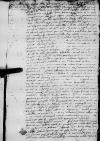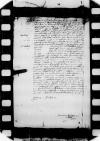List #2361
Ioannes DANTISCUS do Tiedemann GIESEHeilsberg (Lidzbark), 1540-11-29
Regest polski:
Dantyszek zawiadamia Giesego, że w dniu nadania listu z [Lidzbarka] odjechał kasztelan gdański [Achacy Cema], który przedwczoraj powrócił z dworu królewskiego. Na prośbę Cemy Dantyszek opisuje pokrótce jego działania w Wilnie: królowa Bona (Nostra) próbowała zapobiec kontaktom Cemy z biskupem chełmskim [podkanclerzym Samuelem Maciejowskim]. Mimo to Cema we współpracy z Maciejowskim przedstawił królowi [Zygmuntowi I] na osobności powierzone sobie sprawy.
Król [Zygmunt I] zaaprobował ich [członków rady Prus Królewskich] sugestie dotyczące układów z królem rzymskim [Ferdynandem I Habsburgiem] w kwestiach dotyczących księcia [Albrechta Hohenzollerna]. Monarcha wyjaśnił, że twardy ton jego poselstwa na ubiegły sejm [Prus Królewskich] w Grudziądzu był skutkiem nalegań senatorów Królestwa, jednakże [senatorowie pruscy] mogą nań odpowiedzieć zgodnie swoim interesem. Maciejowski doradził Cemie, aby nie wspominać o braku poboru podatku, aby nie obwiniono o to wyłącznie Dantyszka i Giesego. Sugerował, że można tę sprawę załatwić inną drogą. Sprawę Radzyna (Rehden) Maciejowski poruszył z królem bez świadków w dogodnym momencie, tak aby nie dowiedziała się o tym królowa. Król, chcąc okazać łaskawość Giesemu, nie sprzeciwił się powierzeniu burgrabstwa [gdańskiego] [Janowi] Stutte, skoro został on wpisany do dokumentu zwyczajowo wystawianego przez magistrat. W kwestii stypendiów dla młodzieży na studia w Lipsku król oczekuje odpowiedzialnego stanowiska członków rady Prus Królewskich; nie życzy sobie, by ktokolwiek z Prus Królewskich wysyłany był tam na studia. Opaci obszernie usprawiedliwili się przed królem, rzecz została jednak odłożona do wspólnej narady. Król udzieli odpowiedzi na list z sejmu [pruskiego] w Grudziądzu, gdy tylko pozwoli mu zdrowie. Wkrótce kasztelan gdański opisze wszystko obszerniej, o wielu sprawach nie można jednak pisać ze względu na dworskie intrygi.
Dantyszek za jedyny znaczący sukces poselstwa Cemy uważa wiadomość, że nieprzychylne [sprawom pruskim] poselstwo na sejm w Grudziądzu nie wyszło z inicjatywy króla. Kasztelan nie osiągnął niczego w sprawie zboża, ponieważ przeszkodziła w tym królowa. Napisała także do Dantyszka, aby się jej nie przeciwstawiano. Dantyszek prosi, by adresat wpłynął na wojewodę pomorskiego [Jerzego Konopackiego], by ten powstrzymał swojego syna [Jerzego Konopackiego mł.], który chce pozyskać zboże wbrew postanowieniu rady [Prus Królewskich]. Sam Dantyszek również pisał w tej sprawie do wojewody pomorskiego, napominając go równocześnie, by porozmawiał ze szlachtą swojego powiatu o tym, żeby na kolejnym sejmie [Prus Królewskich] okazać wreszcie życzliwość podkanclerzemu [Samuelowi Maciejowskiemu].
Dantyszek przekazuje Giesemu nowiny o trudnej sytuacji na Węgrzech, gdzie trwają walki między możnymi, z których jedni popierają sułtana tureckiego, inni króla [Zygmunta I], inni jeszcze – króla Ferdynanda. Królowa Izabela, odzyskawszy wiano, wraz z synem [Janem Zygmuntem] i fraucymerem opuściła Budę i udała się do zamku, wskazanego jej przez króla rzymskiego [Ferdynanda I Habsburga]. Ferdynand utracił bardzo wielu żołnierzy podczas oblężenia pewnego węgierskiego zamku.
Król [Zygmunt I] ma się nieco lepiej. Zajmuje go kwestia zgody między dysydentami, pertraktuje z papieżem [Pawłem III] i innymi władcami na temat zwołania soboru.
Dantyszek przesyła Giesemu zawierający inne jeszcze nowiny list, otrzymany od zaufanego królowej, podkomorzego sieradzkiego Mikołaja Grabii. Obiecuje Giesemu wspierać jego sprawy.
| odebrano [1540]-12-01 Rękopiśmienne podstawy źródłowe:
| ||||||
Tekst + aparat krytyczny + komentarz Zwykły tekst Tekst + komentarz Tekst + aparat krytyczny Ekscerpty dotyczące podróży Dantyszka
R[everendissi]m[o] patri et domino, domin[o]
Reverendissime in Christo Pater et Domine, frater et amice carissime et honorande.
Salutem et fraternam commendationem.
Rediit tandem
Consilium nostrum, quod ad tractatus cum serenissimo
Summatim haec utcumque attigi. Dominus
Ceterum, si nihil aliud ex hac per
Hungaricae res confusae sunt. Inter primores dissid[iae], digladiationes, nulla, ut gentis natura est, fides. Sunt, qui a[d]
Serenissimus
Alia, quae mihi dominus succamerarius Siradiensis
Quod reliquum est, Dominationem Vestram Reverendissimam in rebus suis bene sperare iubeo. Iis si adminiculum meum prodesse potest, omnem polliceor operam, eandemque Dominationem Vestram Reverendissimam felicissime multis bonis annis valere meque ab illa fraterno amori complecti, in eoque commendatus haberi cupio ex animo.
Datae
Reverendissimae Dominationis Vestrae frater integerrimus


